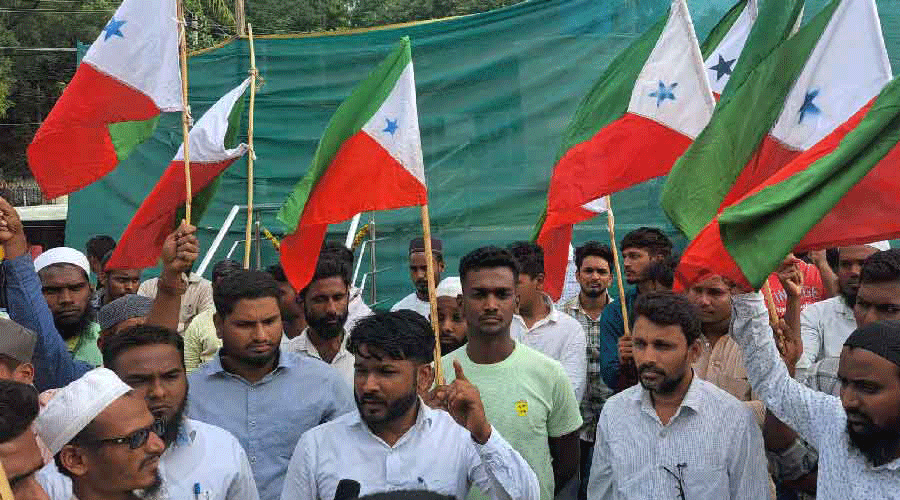
Kerala: Born in 2006, Popular Front of India always in glare
PFI and SDPI gain visibility by participating in protests against Sangh parivar, for instance, over Rohith Vemula’s suicide and new citizenship matrix
 |
| Formed in 2006 by merging various organisations in Kerala, Karnataka and Tamil Nadu, the PFI went on to absorb like-minded outfits from several other states. File picture |
K.M. Rakesh | TT | Bangalore | 23.09.22 : No organisation associated with the Muslim community has in recent memory attracted as much attention from the law-enforcement agencies as the Popular Front of India.
The Delhi-headquartered organisation claims to work for disadvantaged sections, including Dalits. But it is accused by opponents, particularly the Sangh parivar, and investigative agencies of recruiting youths for the ISIS, funding and training terrorists, carrying out targeted killings of rivals, and infiltrating popular movements.
There have been calls over the years, from parivar leaders and several BJP chief ministers, to ban the outfit but so far the Centre has not done so.
Formed in 2006 by merging various organisations in Kerala, Karnataka and Tamil Nadu, the PFI went on to absorb like-minded outfits from several other states.
Eminent academic and political commentator M.N. Karassery said that organisations like the PFI adhered to Maududism — guidelines for a pan-Islamic nationhood as defined by the controversial Islamic scholar Abul A’la al-Maududi.
He said groups like the Muslim Brotherhood in Arab countries and its counterpart on the Indian subcontinent, the Jamaat-e-Islami, too followed this doctrine.
Karassery said it was the Jamaat that planted the seeds for a “right-wing” Muslim organisation like the PFI when it formed its students union, the Students’ Islamic Movement of India (Simi), in Aligarh, Uttar Pradesh, in 1977.
The now-banned Simi quickly took roots on campuses across the country, particularly in Kerala. After the 1979 Iran revolution, Simi began publishing Islamic revolutionary literature and writings of the ideologue of the Iran revolution, Ali Shariati.
Jamaat eventually abandoned Simi, realising it was getting out of control with its hardened Islamist ideology, and described it as the “Islamic Naxalbari”. Simi has remained banned since 2008.
The demolition of the Babri Masjid in 1992 had led to the formation of another outfit, the National Development Front. It was the NDF that eventually morphed into the PFI and inducted, among others, many former Simi cadres and leaders.
Karassery said these outfits were similar to the various arms of the Sangh parivar.
“They are quite like the spokes in the Sangh parivar wheel. These Islamist organisations believe in theocracy, or what they call theo-democracy. But they are all the same and follow Maududism that doesn’t believe in democracy, secularism or nationalism,” Karassery told The Telegraph.
The PFI had initially declared it was uninterested in electoral politics and was a social organisation dedicated to the uplift of minorities and marginalised communities like Dalits.
But it launched a political arm, the Social Democratic Party of India, in 2009 and got it registered with the Election Commission the following year. The SDPI has been contesting elections in Kerala, Karnataka and other states.
The PFI gained notoriety when its activists were accused of chopping the hands of Malayalam professor T.J. Joseph of Newman College in Thodupuzha, Kerala, in 2010. The professor had set a question in an exam paper that the PFI considered blasphemous.
The PFI and the SDPI gained visibility by participating in protests against the Sangh parivar, for instance, over Rohith Vemula’s suicide and the new citizenship matrix.
The PFI’s student wing, the Campus Front of India, has been accused of stridency in connection with the hijab controversy in Karnataka.

0 Response to " Kerala: Born in 2006, Popular Front of India always in glare"
Post a Comment
Disclaimer Note:
The views expressed in the articles published here are solely those of the author and do not necessarily reflect the official policy, position, or perspective of Kalimpong News or KalimNews. Kalimpong News and KalimNews disclaim all liability for the published or posted articles, news, and information and assume no responsibility for the accuracy or validity of the content.
Kalimpong News is a non-profit online news platform managed by KalimNews and operated under the Kalimpong Press Club.
Comment Policy:
We encourage respectful and constructive discussions. Please ensure decency while commenting and register with your email ID to participate.
Note: only a member of this blog may post a comment.